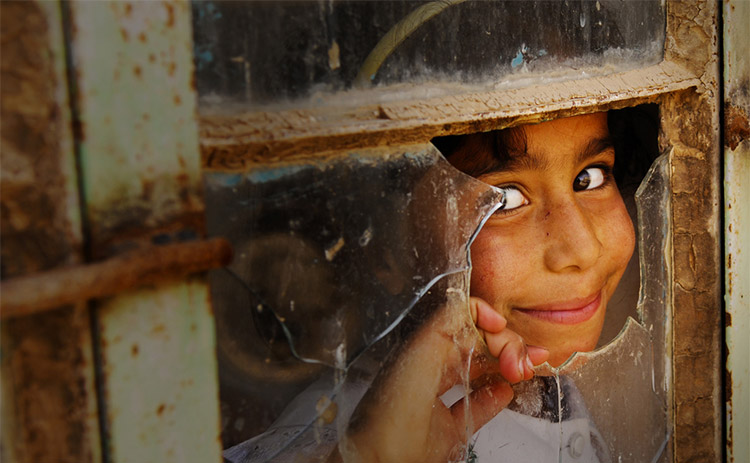UK charity work being hindered by banks' fear of breaching counter-terror legislation
For years, British humanitarian NGOs have criticised counter-terrorism laws for undermining their aid operations, and British Muslim NGOs have argued that they have been disproportionately affected by such laws. Banks have placed restrictions on the services they offer to various UK NGOs working in conflicts like Syria and Gaza, while other NGOs have been hit by allegations of links to terrorism. All of this has affected the work of humanitarian organisations seeking to provide aid in high-risk conflict zones.

An Iraqi girl peeks out of a broken classroom window to watch as US Army deliver new desks to her school in Nawaful, Iraq. Yet In the UK in particular, various factors have brought the impact of counter-terrorism legislation on the provision of international aid into stark focus, including the scaling up of NGO activities to respond to complex crises like Syria, Somalia, Gaza and Iraq (photo: US Air Force by Staff Sgt. Samuel Bendet; www.army.mil)
In the UK in particular, various factors have brought the impact of counter-terrorism legislation on the provision of international aid into stark focus: the scaling up of NGO activities to respond to complex crises like Syria, Somalia, Gaza and Iraq; increased restrictions on access to financial services for many NGOs, the UK government proposal to expand the powers of the Charity Commission and increased dialogue among British INGOs and government counterparts.
A lack of guidance from the UK Government, specifically the Treasury, on how banks should respond to counter-terrorism legislation has resulted in overly risk averse actions being taken towards UK charities working in conflict zones, says a new report launched today.
Driven by a fear of financing terrorism which is a breach of this legislation, international banks including HSBC, UBS and NatWest are effectively “de-risking” by closing and freezing bank accounts held by these charities and delaying, blocking or returning millions of pounds of donations with “no detailed explanation” says the report by UK think tank the Overseas Development Institute (ODI).
“Tens of thousands of people in conflict areas such as Syria, Somalia and Gaza are depending on the life-saving assistance provided by UK charities, but these are precisely the locations that present the highest risks to banks under the counter-terrorism legislation,” said an independent researcher for the ODI’s Humanitarian Policy Group (HPG) Tom Keatinge.?For example, one charity, which requested to remain anonymous, was forced to forgo donations worth £2 million in the last 12 months as a result of funds being blocked by a bank. Salaries paid to the bank accounts of aid workers who live outside of the UK have also been delayed or blocked by banks.
The report UK humanitarian aid in the age of counter-terrorism: perceptions and reality recommends that the UK Government, namely the Treasury, provides greater guidance on how banks, credit card companies, online donation websites and internet payment service companies can comply with the counter-terrorism law without adversely affecting legitimate aid activities.
The report also investigates the claims that UK Muslim charities are being disproportionately affected by counter-terrorism legislation, an issue that has been compounded by repeated allegations of links to extremism and terrorism in the media.
Researchers found that this may relate to UK Muslim charities’ increased exposure to risk owing to the nature of their work – local connections and language skills means they are often able to gain greater access to people in dangerous conflict areas in Syria, Iraq and Gaza – the recent poor image of Islam in the media and, in some cases, insufficiently robust institutional practices which is a problem across the charity sector.
“Many UK Muslim charities sprung up quickly in response to crises such as the Syria conflict, driven by the generosity of their local communities to help. But managing such rapid growth – and ensuring that appropriate professional standards are in place – can be a challenge,” said the director of HPG Dr Sara Pantuliano.
To ensure funds are adequately safeguarded from financing terrorism, the report recommends that All UK charities ensure they have instituted adequate risk management and due diligence processes, including financial and administrative standards in line with UK charity law and the guidance provided by the Charity Commission.